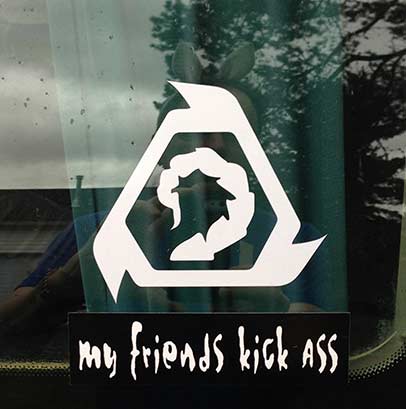This video, which was presented in a TED talk about moral reasoning in animals, shows two monkeys who have each been trained to perform a simple task (handing a researcher a rock) in exchange for a reward (a bit of food).
In the experiment, the researcher could give the monkey a bit of cucumber or a grape as a reward. Monkeys given cucumber rewards were quite happy…unless they saw another monkey being given a grape for the same task. When that happens…well, see below.
The things these monkeys are feeling translate directly into the things that can trip us up as human beings when we’re involved in non-monogamous relationships of all sorts.
OF GRAPES AND CUCUMBERS
The notion that relationships have “cucumbers” (things that help feed the relationship, but aren’t necessarily fun or thrilling) and “grapes” (exciting things that are fun to do) seems straightforward.
The problem, naturally, is that what constitutes a “cucumber” and what constitutes a “grape” can be highly subjective, and can change depending on where you happen to be in the relationship configuration.
For instance, to me some of the most delicious grapes of life are also some of life’s most mundane things: the day-in, day-out living with a partner, doing all the tasks and chores that add up to shared intimacy and a shared life together. I’ve had relationships where I live with my partner and we spend our time doing dishes, watching Netflix, and snuggling on lazy Saturday mornings, and relationships where I see a partner perhaps once a year for a wild frenzy of hot kinky group sex in a French castle.
Don’t get me wrong, the hot kinky sex in a French castle is a grape, no doubt about it. But for me, relationships where I spend time just quietly sharing a life with a partner are incredibly rewarding, and it’s far easier to build intimacy with that kind of shared life than with one week a year spent together. No matter how much fun that week happens to be. With a partner I see seldom, the time spent with that partner can look like an intense whirlwind of nonstop fun, because we have to pack all our relationship time into a very small space. It doesn’t account for the long periods of time spent apart, when the relationship is barely fed at all, with grapes or cucumbers. (I am a person whose love language is touch; it is harder to meet that need long distance.)
To a person who has that day-in, day-out living together, the weekend trips to a faraway land can look like grapes, and the doing of dishes and moving of furniture looks like a dull and unappetizing cucumber. On the other hand, to the partner who only gets my time in small dribs and drabs, the shared experiences of a life spent together looks like a plump, sweet, delicious grape. And so each person sees nothing but cucumbers in front of them, while the other person has an entire plateful of grapes.
GRAPES AND HIERARCHY
When you look at your own plate and see nothing but cucumbers, while it seems like someone else gets entirely 100% grape,it’s reasonable to feel like the monkey in the video up there. And when we feel like that, often our first impulse is to want all the grapes for ourselves.
It gets worse if we feel that we’re entitled to all the grapes, or that someone else might steal our stash of grapes.
Since I’ve been thinking about polyamory in terms of grapes and cucumbers, it has occurred to me that often, the rules and hierarchies imposed in prescriptive relationships, particularly prescriptive primary/secondary relationships, seem calculated to make sure that all the grapes belong to one partner and other partners are metered out nothing but cucumbers.
This can sometimes even go so far as “grape hoarding”–fencing off particularly tasty grapes to make sure nobody else comes near them. (Examples of grape hoarding might be forbidding a partner to go to a certain restaurant with another partner, say, or forbidding a partner to spend any holiday or vacation time with another partner.) Even sharing a grape with someone else can make us feel like that poor monkey on the left, if we feel that grape belongs to us by right. When our monkey emotions get monkey going, someone’s likely to get things flung at them.
The impulse to want to keep our grapes and make sure nobody else takes them isn’t just a human thing, or even a primate thing. Dogs do the same thing; a dog trained to do a trick to get a reward who sees the other dog get that reward for nothing may stop doing the trick.
SEPARATING THE GRAPES FROM THE CHAFF
What are the grapes in a relationship? I’ve been thinking about that ever since my sweetie showed me this video.
Kinky group sex in a Medieval castle is definitely a grape, don’t get me wrong. Intense experiences that form lifelong memories are very tasty indeed.
But focusing on those kinds of grapes, I think, makes me lose sight of the grapes I get every day–the grapes that it’s easy to disregard because I have so many of them. I’ve resolved to be more conscientious about valuing the grapes that I have, the ones I might otherwise take for granted.
If I were to make a list of the grapes I’m blessed with, it would include kinky sex in castles and trips to exotic places, no doubt. But it would also include:
- Being able to wake up nearly every morning with my partner.
- Having my partner close enough to touch, almost all the time.
- Curling up on a rainy afternoon with my partner, snuggling beneath warm covers.
- Building a private language from a shared history of experience.
- Having someone next to me while I deal with all the various ways I have to hold back entropy.
- Being able to plan with someone
- Working on projects with a partner.
- Creating with a partner.
- Having a partner who sees me, who really get me and understands me.
So I do very much like the trips to see my distant sweeties, but I wish they were closer. I enjoy vacation time spent with far-flung lovers, but I would not trade those experiences for living with a partner. At the end of the day, if I had to choose, I would give up the vacations for having the people I love close to me all the time.
And that might be the real test of what’s a grape and what’s a cucumber: Would you choose to trade places with the person you see getting all the grapes? If the vacation experiences seem like such tasty grapes,would you trade a life spent together for a distant, vacation relationship?
How about you, O readers? What are your grapes and what are your cucumbers?










